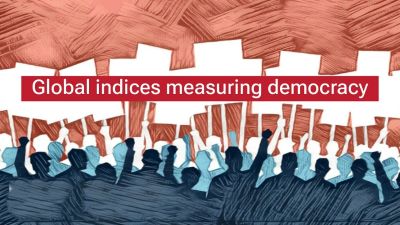Context-
Democracy measurement indices play a crucial role in assessing the state of governance across nations. These indices utilize various methodologies and data sources to evaluate the extent of democracy within a country. In recent times, India's concern over its ranking in these global indices has sparked discussions surrounding the validity and reliability of such assessments. We look into the methodologies employed by democracy measurement indices, India's apprehensions regarding its rankings, and the strengths and weaknesses inherent in these global datasets.
Methodologies in Democracy Measurement
● Observational Data and In-house Coding
Observational data constitutes factual information such as voter turnout rates, providing tangible metrics for assessing democracy. Additionally, in-house coding involves researchers utilizing country-specific data from academic literature, newspapers, and other sources to evaluate democratic characteristics. These methodologies aim to provide objective insights into the state of democracy within a nation.
● Expert Surveys and Representative Surveys
Expert surveys involve selected specialists from various countries offering subjective evaluations of democratic practices. On the other hand, representative surveys gather judgments from a selected group of citizens. While expert surveys offer insights from knowledgeable individuals, representative surveys provide a broader perspective by incorporating citizen opinions.
India's Concerns: Why Democracy Rankings Matter
● Threats to Sovereign Ratings and International Standing
India's apprehension regarding its ranking on global democracy indices stems from concerns over potential repercussions on its sovereign ratings and international standing. Negative assessments by international organizations could undermine India's image as a democratic nation, impacting its diplomatic relations and economic prospects.
● Denouncement of Global Assessments
The Indian government has vehemently refuted global rating assessments of its democratic conditions, labeling the makers of these indices as "self-appointed custodians." Foreign Minister S. Jaishankar criticized the methodology employed by these indices, citing flaws such as inadequate sample sizes and cultural biases. India perceives these assessments as unjust and seeks to challenge them through the development of its democracy index.
● Objective Metrics versus Subjective Evaluation
India argues that democracy indices often prioritize subjective evaluations over objective metrics, leading to inaccuracies in rankings. Despite India's classification alongside countries with authoritarian regimes, Indian officials contend that objective indicators such as fair elections and electoral participation demonstrate its democratic resilience.
Strengths and Weaknesses of Global Datasets
● Strengths
Global democracy indices serve as valuable tools for benchmarking the strengths and weaknesses of regimes across different geographies and periods. These indices offer comprehensive assessments by considering various dimensions of democracy, including electoral participation, civil society functionality, and decision-making processes. By utilizing diverse methodologies, they provide nuanced insights into the state of democracy worldwide.
● Weaknesses
One of the primary criticisms leveled against global democracy indices is the inherent subjectivity in their evaluations. Despite efforts to incorporate objective data, assessments still rely heavily on the judgment of researchers and experts. Furthermore, the scope of countries included in these indices varies, leading to potential biases and oversights. Ideological discrepancies also arise due to the ambiguous definition of democracy, resulting in discrepancies in country rankings.
India's Pursuit of a Democracy Index
● Challenges with Existing Indices
India's decision to develop its democracy index stems from dissatisfaction with existing global assessments. The Indian government perceives flaws in the methodologies employed by these indices, particularly in terms of subjectivity and cultural biases. By creating its index, India aims to provide a more accurate representation of its democratic landscape and challenge negative perceptions propagated by international organizations.
● Objective Assessment and National Representation
India's proposed democracy index seeks to prioritize objective metrics over subjective evaluations, aiming for a more transparent and representative assessment of its democratic practices. By incorporating data from diverse sources and stakeholders within the country, India intends to offer a comprehensive analysis that reflects the nuances of its democratic governance.
● Promoting National Sovereignty and Autonomy
Developing its democracy index allows India to assert its sovereignty and autonomy in evaluating its democratic progress. By relying on domestic expertise and resources, India can tailor the index to suit its unique socio-political context, thereby challenging the perceived hegemony of international organizations in assessing democratic norms.
Conclusion
Global democracy indices play a crucial role in assessing the state of democracy worldwide, but they are not without limitations. India's concerns regarding its ranking on these indices highlight the need for a nuanced and transparent approach to democracy measurement. By developing its democracy index, India seeks to address the shortcomings of existing assessments and promote a more accurate representation of its democratic landscape. Ultimately, a comprehensive understanding of democracy requires a multipronged approach that considers objective metrics, national perspectives, and the complexities of governance in diverse socio-political contexts.
|
Probable Questions for UPSC Mains Exam- 1. How do global democracy indices assess the state of democracy within nations, and what methodologies are employed in this assessment? (10 Marks, 150 Words) 2. Discuss India's concerns regarding its ranking on global democracy indices, including threats to sovereign ratings and international standing, denouncement of global assessments, and arguments regarding objective metrics versus subjective evaluation. Evaluate India's pursuit of developing its democracy index and its potential implications for promoting national sovereignty and autonomy in evaluating democratic progress. (15 Marks, 250 Words) |
Source- The Hindu







